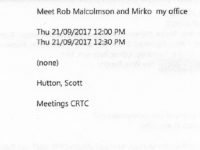The results of this summer’s online harms consultation remains largely shrouded in secrecy as the Canadian government still refuses to disclose the hundreds of submissions it received. Canadian Heritage Minister Pablo Rodriguez now leads the file, but he has said little about his department’s plans or explained why a public consultation should not feature public availability of the submissions. I have maintained an ongoing blog post with links to dozens of submissions that have been independently posted. While even a cursory review reveals widespread criticism, I’ve worked with the University of Ottawa law student Pelle Berends to do a deeper dive on the available submissions. This first post identifies the common concerns raised in the submissions with a chart breaking down the positions posted below. A second post will highlight frequently raised recommendations.
Post Tagged with: "website blocking"
The Canadian Government’s Groundhog Day Copyright Consultations: The Never-Ending Lobbying Battle for Website Blocking and Weakened User Rights Continues
Copyright did not figure prominently in either the government’s election platform or the Speech from the Throne, but the two departments responsible for copyright policy – Innovation, Science and Industry led by Francois-Philippe Champagne and Canadian Heritage led by Pablo Rodriguez – have both been actively consulting on a myriad of issues this year. The departments just released the submissions they received to one of three consultations on copyright, this one on intermediary liability issues. There was a prior consultation on copyright term extension (expected in some form in 2022 given the obligations under the USMCA) and another on innovation policies such as an exception for text and data mining to support the development of artificial intelligence. I submitted responses to all three consultations (term extension here, AI will be posted shortly).
My submission in the intermediary liability consultation focuses on two main points.
Blocking is Back: Why Internet Blocking is the Next Big Canadian Policy Battle
In early 2018, Bell led a consortium of companies and organizations arguing for the creation of a new website blocking system in Canada. Complete with a new anti-piracy agency and CRTC stamp of approval, the vision was to create a new system to mandate site blocking across ISPs in Canada. Canadians challenged the so-called FairPlay proposal and the CRTC rejected the Bell application on jurisdictional grounds. Since that time, the Canadian courts have been dealing with site blocking requests (the Federal Court of Appeal is soon set to hear arguments on the issue) and the Canadian copyright review conducted by the Standing Committee on Industry, Science and Technology decided against recommending the creation of a new administrative system for site blocking.
Application Denied: CRTC Rejects Bell Coalition Website Blocking Proposal
The CRTC this morning rejected the Bell coalition’s website blocking proposal, concluding that the application to establish a new anti-piracy agency and approve site blocking without court oversight falls outside its jurisdiction. Opponents of the site blocking proposal frequently cited concerns with the proposal and the limits of the CRTC’s mandate: my posts discussed how it failed to further and undermined the Telecommunications Act policy objectives, and was inconsistent with the CRTC’s policy direction. Similar comments came from groups such as ISOC Canada, which argued that the applications involved copyright, not telecommunications.
CRTC Truthiness: New Docs Reveal New Story About Bell Meetings with the Commission on Website Blocking
Earlier this year, access to information documents obtained by the Forum for Research and Policy in Communications revealed that Bell had presented its plan for website blocking to CRTC officials months before it was formally filed to allow for public review and comment. As far back as July 2017, Bell pressed a CRTC commissioner for a meeting, which led to a Commission presentation in September 2017. The CRTC downplayed the meeting, telling reporters in response to queries that there was a meeting with Commission legal staff on September 21, 2017.











